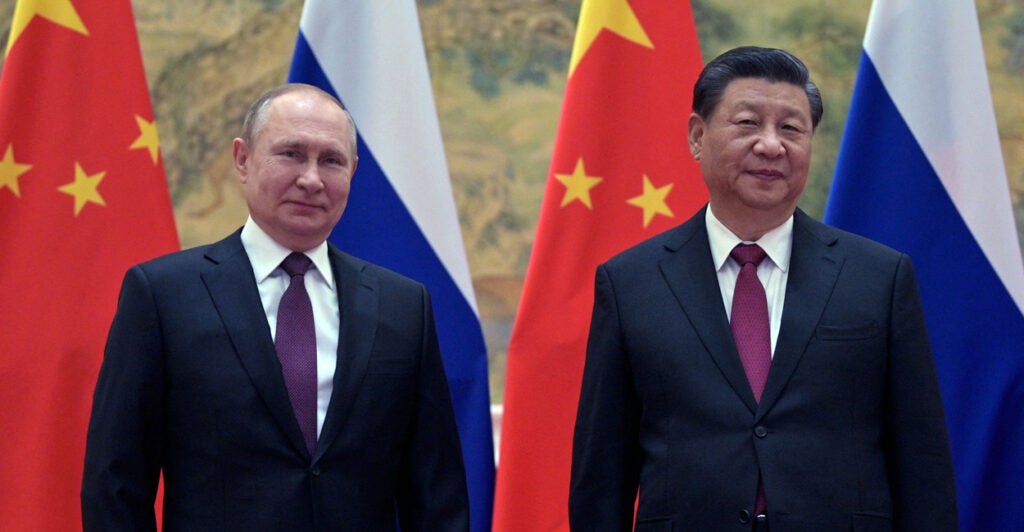In the wake of Russia’s invasion of Ukraine, Russian President Vladimir Putin deserves the world’s unmitigated scorn, but not the United States’ undivided attention. For while Russia today may be an enemy of the West, it is not really a rival. For that, we must look to China.
Putin’s fantasy of resurrecting a greater Russian empire is just that, a fantasy. In reality, Russia is a stale husk of its former self. In the chess game of grand strategy, Putin’s invasion of Ukraine is not a rook attacking a pawn—it’s a petulant child overturning the board.
Yes, the United States must assist Ukraine and our NATO allies to answer Putin’s aggression. And President Joe Biden should do everything in his power to strangle Russia’s energy industry and unleash our own. But talk of this war drawing the United States into a new global conflict misses the point: We’re already in one and have been for years.
It’s one that China started a long time ago. And that conflict is not one the United States should worry about being “drawn into,” but one we will either join or lose.
China today is a more dangerous adversary than the Soviet Union at its height. The Chinese Communist Party enjoys strategic advantages Moscow never did, with greater capacity to project power around the world.
Five decades of diplomatic engagement with China, and three of open trade, should leave us with no illusions about the Chinese Communist Party’s ambitions or its ruthless pursuit of them. Like the Soviet Union, the Chinese Communist Party does not care about gauzy abstractions like “the international community” or even its own people, as clearly demonstrated by its social credit system and its treatment of religious minorities.
As my colleague Dean Cheng wrote, “[Chinese President Xi Jinping] made clear that the [People’s Republic of China] won’t tolerate being lectured, nor will it evolve in directions set by others. China has its own ‘core interests,’ which it will not make concessions on—an important point when considering developments ranging from the South China Sea to human rights to cyberspace and outer space to expectations of a more liberal CCP.”
China is in this fight. The United States still isn’t. And Biden’s waffling weakness on Ukraine is only further emboldening it. Consider how China has undercut the economic sanctions against the Russian economy through new oil and gas deals. It is past time for the United States to take the Chinese Communist Party at its word and treat it like the dangerous strategic rival it is.
How?
Congress and the president can start by finally clarifying our relationship as that of genuine adversaries, not friendly competitors.
All members of the Chinese Communist Party and other Chinese nationals should be barred from national security-related research funded by federal contracts and grants, as well as from owning land near U.S. national security facilities. Americans should likewise be barred from investing in any firms connected to China’s military or surveillance state.
We should resurrect the China Initiative, the Department of Justice’s highly effective project targeting Chinese espionage that Biden has just ended. We need to hold the Chinese Communist Party’s leaders and lackeys accountable for their atrocities, from whatever happened at the Wuhan Institute of Virology in 2019 to the ethnic cleansing of China’s Uyghur minority.
American CEOs, too, should be made personally liable if their businesses knowingly provide technological assistance to Beijing’s human rights abuses. Additionally, Chinese media outlets and official spokesmen should be booted from American social media. Injecting Chinese Communist Party propaganda into America’s domestic political debates represents Big Tech at its worst.
Diplomatically, we need to stop negotiating meaningless climate treaties and nuclear arms control agreements that bind us and our allies, but let China continue to produce carbon and warheads to their hearts’ content.
We also must start building a permanent, China-resistant economy via strategic economic disentanglement. That means working with allies to establish strategic stockpiles of critical electronics and the raw, rare earth minerals they require, new production and manufacturing capacity—especially in critical industries like energy and pharmaceuticals—with the unequivocal goal of cutting China out of U.S. supply chains.
As we strategically withdraw from China, we should strategically embrace Taiwan—diplomatically, economically, and militarily, including selling it as many weapons as it wants to buy.
This approach is neither an escalation nor a provocation. It’s a realization of both about how we see China and how China sees the world. America has no interest in starting another Cold War, but we have every interest in winning the one Beijing launched against us years ago.
And it is in the context of this new Cold War that we should see all our strategic challenges, including Putin’s war against Ukraine. Even more important than what we do to Russia or in Ukraine is what China sees us do, and whether it looks at the United States as a formidable adversary or a declining and irresolute superpower.
For us, whether we like it or not, the most important theater in Putin’s war in Ukraine is neither Kyiv nor Moscow, but Beijing. If Biden doesn’t have the grit and determination to deal with the Chinese Communist Party, then he’ll never be able to deal with Putin.
This article originally appeared on Fox News.
Have an opinion about this article? To sound off, please email letters@DailySignal.com and we’ll consider publishing your edited remarks in our regular “We Hear You” feature. Remember to include the URL or headline of the article plus your name and town and/or state.
